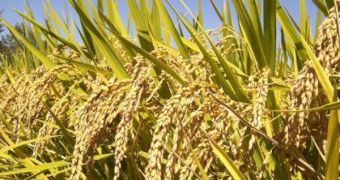Millions of people around the world will be at risk of losing access to even basic crops such as rice in the near future, if the planet's warming trend is not immediately curved. The conclusion belongs to a report drawn out by a team of international experts.
Rice is the most important food source in the world as far as crops go, and it is solely responsible for keeping large swaths of population alive, especially in Asia. Any danger to the rice supplies could easily translate into vast amounts of deaths.
As temperatures grow around the world, due to the nefarious influence of climate change and global warming, these cultures are placed at increased risk, experts say. Fighting this trend could have numerous positive advantages.
According to the recent document, the warming rates Asia has been experiencing over the past quarter of a century have already cut own yields by no less than 10 to 20 percent. The reductions are even larger in some areas.
“We found that as the daily minimum temperature increases, or as nights get hotter, rice yields drop,” says the lead author of the new investigation, Jarrod Welch. He is based at the University of California in San Diego (UCSD), where he is a graduate student in economics.
The research team documented the cases of 227 rice farms, in six Asian nations that grew rice by excellence. All of the farms were irrigated according to needs. The data spans more than six years of ongoing observations.
Details of the work were published this week, in the online early issue of the esteemed journal Proceedings of the National Academy of Sciences (PNAS). The research was conducted in Asia because the area produced 90 percent of the rice in the world.
“Our study is unique because it uses data collected in farmers' fields, under real-world conditions. This is an important addition to what we already know from controlled experiments,” Welch explains.
“Farmers can be expected to adapt to changing conditions, so real-world circumstances, and therefore outcomes, might differ from those in controlled experimental settings,” the scientist concludes, quoted by ScienceDaily.

 14 DAY TRIAL //
14 DAY TRIAL //